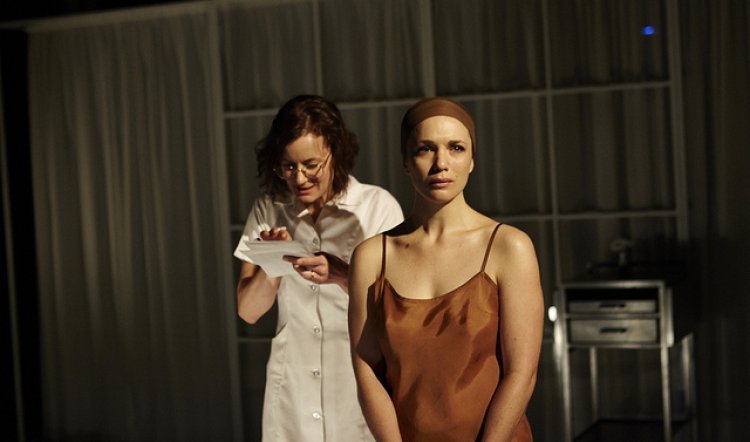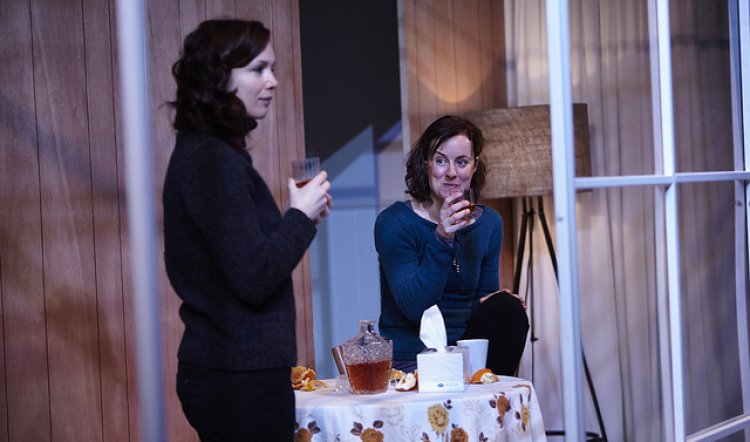
PERSONA
PERSONA, Belvoir and Fraught Outfit at Upstairs Belvoir. 24 July-18 August 2013. Photos by Ellis Parrinder, above and right: Meredith Penman and Karen Sibbing.
When Adena Jacobs was lured away from Melbourne late in 2012 to become one of Belvoir's two Resident Directors she had recently scored a major critical and popular hit with Persona. Her adaptation for the stage of Ingmar Bergman's seminal film of the same title is now at Belvoir in the "much anticipated" category.
Persona is one of the most quoted and admired films of the 20th century and - being Bergman - is also one of the more enigmatic and contentious; all of which bodes well for a rich evening in the theatre. Whatever one's personal take on it, the likelihood of argument and contradictory views are extreme. And that's potentially more than satisfactory too. So…
Rather than merely transpose or attempt to recreate the film itself, Jacobs and her co-creators designer Dayna Morrissey and lighting designer Danny Pettingill have instead focused on the script and the cool white visual motifs of stark curtains, simple, elegant frames and passing references to Scandinavian furniture design. The result is a three-dimensional anchoring of an otherwise ethereal set of ideas and images, but with sufficient acknowledgement of the essential abstraction of the original that it does not become mired in the concrete.
This is theatre, however, and whatever one thinks of the film is to some extent irrelevant - or should be - I suggest. The surface story is relatively uncomplicated: a famous actress, Elizabeth Vogler (Meredith Penman) is apparently struck dumb - or just decides not to speak any more - in the middle of Elektra. Seemingly sleepwalking through the days that follow, she is packed off to a summer cottage by the sea with a young and quickly star-struck nurse Alma (Karen Sibbing).
As so often happens when one person doesn't talk, the other one instantly develops verbal diarrohea. Alma begins tentatively enough but is soon pouring out her innermost secrets to her sphinxlike employer. At the same time she unwittingly explores Elizabeth's psycho-drama by discussing her travails much as they might pick over a distant celebrity through the medium of the gossip rags. So we learn that Elizabeth is married and has a young son but also that she cannot reconcile herself to either wifely or maternal behaviour.
Alma is not the controller however, despite being in charge, and Elizabeth's casual sellout of Alma's secrets is shocking in its callous amusement. The scenes between the two women - one so painfully voluble, the other silent but eloquent - are immensely powerful. It's perhaps inevitable that the subsequent falling dominoes of events - when Elizabeth's husband arrives - develop an almost farcical momentum of clumsy, frantic sex and pert, bared breasts.

Sibbing and Penman are compelling as the yin and yang of each other and human communication. Is it love or hate that motivates them, individually and together? Are they real or imagined in their own minds and our view? And given that Elektra is the catalyst, are they playing out a version of Jung's theory of the child's competition with a parent for sexual possession of the other parent?
Whatever you might think or decide, it's likely that your companion and others in the row next to you will have different ideas. It's part of the pleasure or pain of such deliberately open-ended and obfuscatory work. Bergman is not for those wanting ends neatly tied and clarity handed over on a plate. It is at once gripping and remote, emotionally raw and disconcertingly chilly.
The performances by Sibbing and Penman are spellbinding - the former so visceral and open, the other so unconnected and contained and both heartrendingly sad in their very different ways.
Russell Goldsmith's sound design - rain, distant breakers on a beach - paints in the colours of life happening somewhere else that are entirely missing from the monotone elegance of the summer house. It makes for an unlikely outward calm in which the fraught interior maelstroms of the two women co-exist. Until the end, that is, when the austere, blond wood stylishness of the summer retreat is violated by the sudden appearance of a chair.
It's no ordinary chair and there is no explanation of it or attention paid to it, but it is a jarring ugliness: a dark mahogany balloon-back, velvet-upholstered dining chair of the kind that might be found in any middle class European home, but never in Bergman's Scandinavia. It's utterly inappropriate and as shocking as anything that has gone before - a moment of comic and emotional genius.



